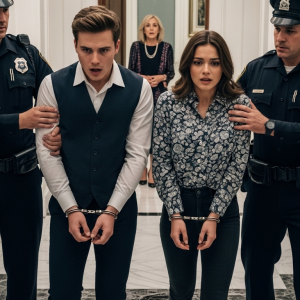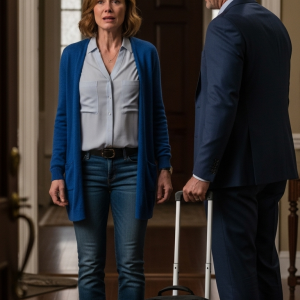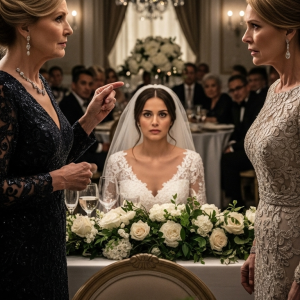The late afternoon sun streamed into Chloe and Mark’s backyard, illuminating a picture-perfect scene. Pastel balloons in shades of mint and lavender danced in the gentle breeze. A table overflowed with meticulously arranged cupcakes and finger sandwiches. Friends and family mingled on the manicured lawn, their laughter a soft melody celebrating the imminent arrival of a new life. It was a perfect baby shower.
But beneath the flawless surface, a quiet poison was seeping in. Its source was Diane, Mark’s mother. Dressed in a severe, cream-colored suit that stood in stark contrast to the party’s soft palette, she moved through the celebration with the air of a hawk circling its prey. She wasn’t celebrating; she was inspecting, judging, and finding everything wanting.
Chloe, radiant in a simple white sundress that hugged her baby bump, maintained a smile that was beginning to feel like a mask. She had endured Diane’s subtle warfare for years: the backhanded compliments about her cooking, the constant, glowing references to Mark’s ex-girlfriend, the thinly veiled criticisms of her career.
“The house looks… clean, Chloe,” Diane had said upon arriving, running a finger along a spotless windowsill. “It’s amazing what one can do with such a modest space.”
Mark, ever the peacemaker, remained willfully blind. He saw a mother who was a “bit traditional,” “set in her ways.” He refused to see the saboteur who viewed his wife as an unworthy usurper. “Mom’s just a little old-fashioned,” he’d whisper to Chloe after a particularly sharp comment. “Don’t let it get to you, honey. That’s just who she is.”
The party reached a crescendo of polite chatter when a delivery man arrived with a ridiculously large gift basket. It was wrapped in gaudy gold cellophane and filled with designer baby clothes and a silver rattle that was surely more expensive than their stroller. The card was from Sophia, Mark’s high-school sweetheart.
Diane seized the opportunity. “Oh, look everyone!” she announced, her voice ringing out across the lawn. “From Sophia! Such a thoughtful, generous girl. She always had such impeccable taste. A real class act.” The implication was clear: everything Chloe was not.
Chloe felt a familiar knot tighten in her stomach, but her expression remained serene. She knew this was coming. In her purse, tucked away in a side pocket, was a thick manila envelope. It was a final report from a private investigator she’d hired two weeks ago, a desperate last resort after months of feeling like she was going mad. Her suspicions about her mother-in-law and Sophia had not been paranoia. They were fact.
She had the weapon. She just needed a reason to use it. A reason so undeniable that even Mark could no longer look away.
The breaking point came, as it often did, with Diane’s need for absolute control. After the gifts had been opened and Chloe had thanked everyone, Diane stood up, tapping her water glass with a knife for attention. A hush fell over the guests.
“Now that we’ve seen all these lovely… things,” she began, a dismissive wave toward the pile of presents, “it’s time for the most important gift of all. The family name.” She beamed at Mark, ignoring Chloe completely. “I’ve decided, and I’m sure Mark agrees, that my first grandson will be named Arthur, after his late grandfather.”
It was a declaration, not a suggestion. A power play delivered in front of an audience.
Chloe felt a dozen pairs of eyes turn to her. She took a slow, steadying breath. This was it. “That’s a very traditional thought, Diane,” she said, her voice polite but lined with steel. “But Mark and I have already chosen a name for our son. And we’ll be sharing it when he arrives.”
The public rejection was more than Diane’s fragile ego could handle. The mask of strained civility shattered, and the raw, ugly rage beneath was unleashed. Her face contorted, turning a blotchy, furious red.
“What did you say?” she hissed, her voice low and dangerous. “You have no right. That baby is a Harrington. He is my grandchild!”
“If I have no value in this house,” she suddenly screamed, her voice cracking with fury, “then neither does any of this trash!”
In a shocking burst of violence, she lunged toward the gift table. With a sweep of her arm, she sent presents, cards, and handmade blankets tumbling to the grass. Guests gasped and jumped back. She wasn’t just angry; she was unhinged.
She tore at gift boxes, ripping the delicate wrapping paper to shreds. The climax of her rampage came when she seized a heavy crystal vase—a gift from Chloe’s own mother. Her eyes, wild and manic, locked on Chloe. With a guttural scream, she hurled it against the brick wall of the house, just a few feet from where Chloe stood.
The vase exploded in a shower of glittering shards. The sound was like a gunshot in the quiet afternoon.
Mark, finally shocked out of his stupor, rushed forward. “Mom, stop it! What are you doing? Have you lost your mind?”
Diane shoved him, her own son, with surprising force. “Get away from me!” she shrieked. “This is my son’s house! You let this woman poison you against me!”
The party was in chaos. Guests were retreating, pulling out their phones, their faces a mixture of fear and disbelief. But amidst the wreckage and the screaming, Chloe was an island of terrifying calm. She had what she needed. She pulled out her phone.
Chloe walked through the chaos toward her husband. He was still trying to reason with his mother, who was now weeping and screaming incoherently. Chloe didn’t say a word. She simply held up her phone in front of Mark’s face and pressed play.
The screen lit up with a video, shaky at first, clearly filmed from a distance. It showed a quiet corner of a coffee shop. Two women were at the table. Diane and Sophia.
The audio was crystal clear. Chloe had paid extra for it.
On the screen, Sophia slid a thick white envelope across the table. Diane took it, her movements furtive, and slipped it into her purse.
“Just keep the pressure on,” Diane’s voice said from the phone’s speaker, calm and conspiratorial. “He’s weak when it comes to you. Always has been. When the baby comes and Chloe is a hormonal, exhausted mess, he’ll come running right back to you. You just need to be there to catch him.”
Mark stared at the screen. His face went slack, the blood draining from it. He looked from the calculating, venomous woman on the phone to the shrieking, violent woman standing in the wreckage of their party. And in that horrifying instant, the two images merged into one.
The truth crashed down on him with the force of a physical blow. This wasn’t a mother having a bad day. This wasn’t a woman who was “old-fashioned.” This was an enemy. An enemy who had taken money to actively, maliciously, and systematically try to destroy his marriage and his family. The madness on display in their backyard wasn’t a sudden breakdown; it was the true face of the woman he called his mother.
He looked at Diane, but he saw a stranger. His voice, when he finally spoke, was devoid of all warmth, all love, all filial piety. It was as cold and sharp as a shard of the broken crystal on the ground.
“Mom,” he said, the word sounding like a foreign object in his mouth. “I want you to leave my house. Right now.”
Diane, caught off guard by his tone, let out a derisive, spluttering laugh. “You’re kicking me out? You wouldn’t dare! You don’t have the spine!”
Mark slowly shook his head, a look of profound and terrible clarity in his eyes. He turned away from her, pulled out his own phone, and dialed 9-1-1. His voice was steady, his resolve absolute.
“Yes, hello. I need to report a disturbance,” he said into the phone. “There is a person in my home who is destroying my property and is refusing to leave.” He paused, listening to the dispatcher. “Yes… yes, I’m the homeowner. I want to press charges.”
The arrival of two police cruisers, sirens off, cast a grim silence over the ruined party. The officers stepped into the backyard and surveyed the scene: the overturned tables, the shredded gifts, the frightened guests, and Diane, who was now sitting on a lawn chair, defiantly refusing to move.
They spoke to Mark first, who calmly recounted the events, his voice unwavering. They spoke to Chloe, and then to a few of the guests who had witnessed the vase being thrown. Finally, they approached Diane. Her belligerence and refusal to cooperate sealed her fate.
With Mark’s official statement and his explicit desire to press charges for vandalism and trespassing, the officers had no choice. One of them produced a pair of handcuffs.
The clicking sound as they closed around Diane’s wrists was the final, irrevocable sound of a family breaking apart. She didn’t scream or fight. She just stared at Mark with eyes full of pure, undiluted hatred.
The walk of shame was excruciating. Diane was escorted out the front of the house, in handcuffs, past neighbors who had come out to see what the commotion was about. For a woman so obsessed with appearances and social standing, it was a fate worse than death. A public, undeniable humiliation from which she would never recover.
As the police car pulled away, Mark finally turned and wrapped his arms around Chloe. The strength that had held her together for so long finally gave way, and she sobbed into his shoulder—tears not of sadness, but of pure, unadulterated relief. The war was over.
He had done it. He had looked the monster in his life in the eye and chosen his real family. He had severed the toxic limb to save the body, a decision both agonizing and absolutely necessary.
Three months later, the chaotic noise of the baby shower felt like a distant, bad dream. The only sounds were the soft, rhythmic beeping of a hospital monitor and the gentle cooing of a newborn. In the quiet, sterile peace of the maternity ward, Chloe held their son, a perfect, tiny bundle wrapped in a blue blanket.
Mark sat beside her, his hand resting on the baby’s back. He looked at his wife and his son, and a wave of profound peace washed over him. This was his family. This was his world. Everything that mattered was right here in this room.
His phone buzzed. A text from his lawyer. “Diane accepted the plea deal. Probation, mandatory anger management, and a permanent restraining order. It’s over, Mark.”
He read the message, took a deep breath, and deleted it. He didn’t need a reminder. The past was a closed chapter, a story he would never revisit.
He looked at Chloe, who was smiling down at their son. Her face was tired but serene, free from the lines of stress and anxiety that had been her constant companions for years. He leaned over and kissed her, then gently kissed his son’s forehead.
They had built a new family, forged in the fires of betrayal and protected by a hard but righteous choice. The foundation was solid, built on truth, and now, finally, they could begin to build their life upon it in peace.
The weeks that followed the birth of their son, whom they named Leo, were a study in quiet contrasts. The house was filled with new sounds—the soft cries of a newborn, the gentle rock of a cradle, the whispered lullabies from Chloe in the dead of night. Yet, what was most profound was the sound that was missing: the jarring, intrusive noise of Diane’s influence.
There were no unsolicited phone calls criticizing their parenting choices. No surprise visits that felt more like inspections. No passive-aggressive gifts with unspoken strings attached. The silence she left behind was vast, and at first, it was unsettling for Mark. It was the silence of an amputation, a part of him, however diseased, now gone forever.
One evening, while Chloe and Leo were sleeping, he found himself in the hallway, staring at a framed photo on the wall. It was from his college graduation. A younger, happier version of himself stood with his arm around a smiling Diane. For a moment, a wave of grief, sharp and bitter, washed over him. He wasn’t grieving the woman who had been led away in handcuffs. He was grieving the woman in this picture, the mother he thought he had, the one who was supposed to be a loving grandmother to his son.
He was mourning a memory, he realized, and perhaps a fantasy. The reality was that the woman in the photo had been planting the seeds of her toxicity for years; he had simply refused to see the garden she was growing. He felt Chloe’s hand on his back and turned to see her standing there, her expression full of understanding. She didn’t need to ask what was wrong.
“You’re allowed to be sad, Mark,” she whispered, leaning her head against his shoulder. “You lost a mother. Even if it was to save your family.”
“I know,” he said, his voice thick with emotion. “I just keep thinking… I should have done it sooner. For you.” This admission, this final shedding of his old blindness, was perhaps the most healing thing he could have said. It was an acknowledgment of her long, lonely battle.
The true test of his resolve came a week later. The call was from his Aunt Carol, Diane’s sister. She had always been the family diplomat, the one to smooth over ruffled feathers.
“Mark, honey, I know things have been… difficult,” she began, her voice syrupy with false concern. “But your mother is devastated. She’s all alone. She’s made mistakes, yes, but blood is thicker than water. She is your mother, and she deserves forgiveness.”
The Mark of six months ago would have buckled. He would have been consumed by guilt, swayed by the appeal to a duty he no longer believed in. But the man on the phone now was different. He was a husband and a father first.
“Aunt Carol,” he said, his tone calm and unshakeable, leaving no room for negotiation. “I appreciate you calling, but my position on this is final. What Diane did wasn’t a ‘mistake.’ It was a deliberate, calculated campaign to destroy my marriage. She put my wife, a pregnant woman, in a state of constant distress. She became violent. That isn’t something you forgive with a phone call.”
“But she’s getting help! The court ordered it!” Carol insisted, her voice rising.
“That’s good. I hope she does,” Mark replied coolly. “But her healing is her journey. It has nothing to do with us anymore. My family—Chloe and my son—they are my only priority. That is what ‘blood’ means to me now. Please don’t call about this again.”
He ended the call before she could respond. He felt a tremor in his hand, the adrenaline of a confrontation faced and won. He had held the line. Chloe, who had overheard the conversation from the living room, looked at him with an expression of profound love and respect. The last shadow of doubt she ever had about their partnership vanished in that moment.
A month later, a single, sterile cardboard box arrived from Diane’s lawyer. It contained a few of Mark’s childhood keepsakes—his first baseball glove, a handful of worn-out comic books, a dusty trophy. It was a final, transactional severing of ties.
Together, he and Chloe sorted through it. He shared a few funny stories, but there was no deep, painful nostalgia. These were relics from a different life, belonging to a different person. He decided to keep the baseball glove. The rest, he packed away to donate.
At the bottom of the box was a small, faded photograph of him as a baby, wrapped in the same kind of blue blanket that Leo was currently sleeping in. He picked it up and studied his own infant face, then walked into the nursery. He stood over the crib, looking at his son, so peaceful and so safe.
He wasn’t his mother’s son anymore, not in the way that mattered. He was Leo’s father. His past did not have to be his child’s future. He slipped the old photo into a drawer, a piece of history that had lost its power, and gently placed his hand on Leo’s chest, feeling the steady, rhythmic beat of a new heart, a new beginning, a new and unbroken family.




